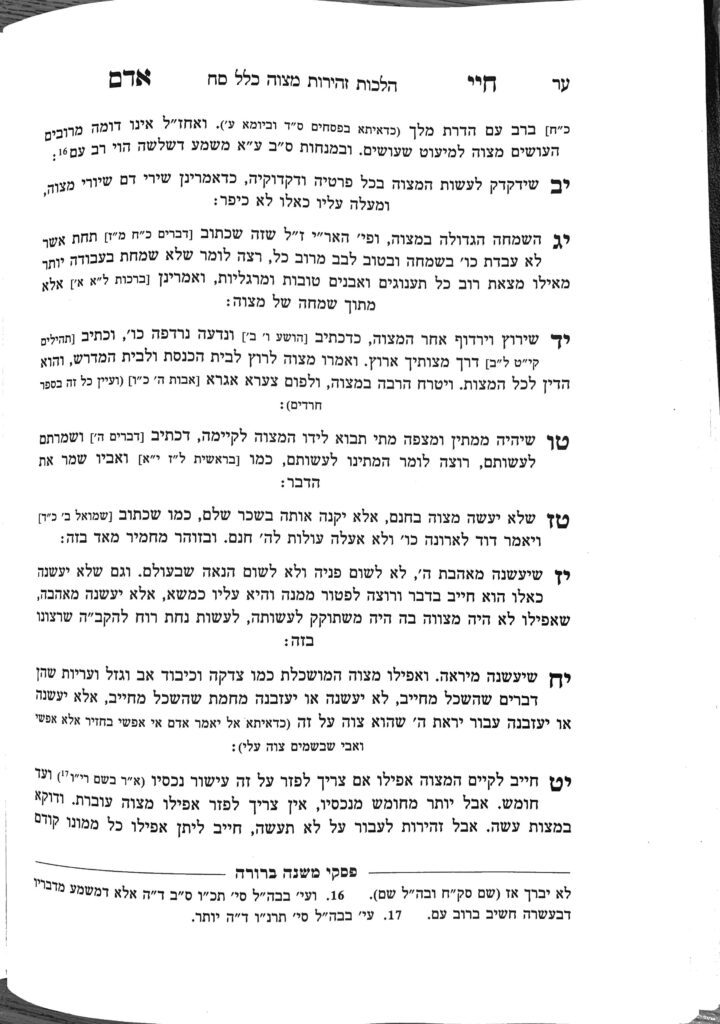We are beginning siman 13, which discusses performing a mitzvah with simcha. The next few simanim all discuss the appropriate manner in which to do a mitzvah, such as running after mitzvos, anticipating mitzvos, spending money for mitzvos, doing mitzvos out of love of Hashem, and doing mitzvos out of fear of Hashem.
The Chayei Adam begins our siman writing that one should have tremendous simcha when performing a mitzvah. He quotes the Arizal, who quotes the pasuk tachas asher lo avadeta es Hashem Elokecha besimcha, mei’rov kol (Devarim 28:47). The simple understanding of the pasuk is that when we have all of the physical benefits and lacked nothing yet chose not to serve Hashem, we will be forced to serve our enemies while lacking everything. The Arizal understands that the pasuk refers specifically to when Klal Yisroel did not serve Hashem out of a simcha greater than the simcha they had for other parts of life (with mei’rov kol meaning greater than anything else, i.e., any other simcha). For example, if one pictures how much pleasure they would have from winning the lottery, a person should perform a mitzvah with even greater pleasure.
The Gemara says that a person should begin davening in a state of simcha, and that simcha is generated from having performed mitzvos.
In siman 669, which discusses Simchas Torah, the Mishnah Berurah quotes the Sefer Chareidim, who writes that the Arizal testified that he was zoche to the knowledge and clarity he had of Hashem and Torah due to his simcha shel mitzvah, the simcha he had when performing a mitzvah.
At the end of Hilchos Lulav (8:15), the Rambam discusses the mitzvah of simcha. He then adds that the simcha a person has when performing a mitzvah is a tremendous form of avodah to Hashem. If a person withholds that simcha, he deserves to be punished, and he quotes the pasuk brought above. The Maggid Mishneh comments that the appropriate way to understand the Rambam is that a person should not perform mitzvos because they are a burden or responsibility, but out of excitement and because it is the correct thing to do. With this perspective, a person will perform mitzvos because they are the emes, and therefore any efforts necessary to expend towards mitzvos will feel easy. A person was created to perform mitzvos, and when a person does what they are created for, they will feel happy. Any other simcha is dependent on physical things, which do not last, but mitzvos are an eternal simcha.
If a person has an opportunity to fulfill the purpose for which they were created, and fulfilling that purpose is valuable to them, they will be happy when they perform mitzvos because they are a person who truly commits themselves to serving Hashem.
In siman 17, the Chayei Adam will discuss doing mitzvos out of love of Hashem, which will add another layer to this concept. In this siman, he is discussing the excitement which one should feel when performing a mitzvah, both when preparing for the mitzvah and in the actual performance of the mitzvah.
Summary
One should feel a tremendous simcha both when preparing for a mitzvah and in the actual performance of a mitzvah.



